How Kidney Stones Form
If you have ever passed a kidney stone, you most likely would not wish to go through this excruciating process again; in fact, you probably would not wish it on your worst enemy. Kidney stones are common in both males and females and can strike again in half of those who develop it, usually within 5 to 7 years if preventive measures are not taken.
Kidney stones form when substances like oxalate, calcium, and uric acid become overly concentrated and create crystals in the kidneys. Those crystals then grow larger and form kidney stones. About 75 percent of all kidney stones are calcium oxalate stones.
After kidney stones develop, they can dislodge and pass down to the ureter, blocking urine flow. This can lead to periods of severe pain and discomfort, including pain in one side of the body between your stomach and your back. At times, pain can be accompanied by blood in the urine, nausea, and vomiting.
As the stones travel down the ureter to the bladder, they may result in bladder pressure, groin pain, or frequent urination. If you experience any of these symptoms, you should speak to your doctor. He/she will probably carry out a urinalysis and renal ultrasound, abdominal x-ray, or CT scan to determine if you have kidney stones and confirm their size and number.
Diagnosis of Kidney Stones
If your doctor suspects that you have a kidney stone, he/she may carry out diagnostic tests and procedures, such as:
1. Blood test:
Blood tests may reveal elevated levels of calcium or uric acid in your blood. Blood tests help in monitoring the health of your kidneys and may lead your doctor to check for other medical conditions.
2. Urine test:
A 24-hour urine collection test may indicate that you’re excreting a lot of stone-forming minerals or too few stone-preventing substances. The doctor may request that you perform two urine collections over two consecutive days when running this test.
3. Imaging:
Imaging tests may show kidney stones in the urinary tract. The testing process may show even tiny stones. Simple abdominal X-rays are not often used because the imaging test can miss small kidney stones.
4. Analysis of passed stones:
If you have already passed stones, the doctor may ask you to urinate through a strainer to capture stones passed. An analysis will show the makeup of the stones. The gathered information is used to determine what caused your kidney stones and to help form a plan to prevent more kidney stones from forming.
Treatment Options for Kidney Stones
Small kidney stones will often pass through and out of the urinary tract on their own. These stones are usually less than 5 mm in diameter. Stones between 5 and 10mm have a 50 % chance of passing spontaneously. If the stone is larger than 10mm or doesn’t pass on its own, or there are complications, then the stone will need to be dissolved, removed with an endoscope, or broken up with shock waves.
Can You Dissolve Kidney Stones? How to Dissolve Kidney Stones?
Alkali citrate can dissolve uric acid stones or cystine stones. Uric acid stones are more common than cystine stones and often form in people with diabetes. Uric acid and cystine stones form in urine that is acidic (pH 5-5.5). Diabetics usually have persistently acid urine. Both uric acid and cystine stones can be dissolved if the urine is made alkaline (pH 6-7). Alkali citrates (potassium citrate) or sodium bicarbonate are widely used to increase urine pH and help dissolve uric acid or cystine stones. Moonstone is a combination of 3 different alkali citrates that will change the urine pH to the alkali range needed to dissolve existing uric acid or cystine stones and help prevent formation of these stones. Drinking large quantities of water will also expedite the dissolution of these stones in alkaline urine. If you have a urinary infection while passing a stone, it probably won’t be possible to treat the stone with alkaline therapy. The ability to dissolve a uric acid or cystine stones with alkali citrates will usually alleviate the need for surgical intervention.
Why alkali citrates are used to prevent all types of kidney stones
The ability of alkali citrates to increase urine pH, as discussed above, is only one of the benefits of these organic compounds in the management of kidney stones. The majority of kidney stones in the US are calcium oxalate stones. Alkali citrates significantly increase the amount of citrate in the urine and can also lower the amount of calcium in the urine. Citrate is a potent inhibitor of calcium oxalate stone formation by binding to the urinary calcium and preventing the formation of calcium oxalate crystals. Urinary citrate will therefore prevent the formation, growth and aggregation of these crystals. Citrate also is an inhibitor of calcium phosphate crystals and stones.
Key points about alkali citrate, dissolving kidney stones, and preventing kidney stone formation:
1. Alkali citrates can dissolve and prevent uric acid and cystine stones by raising urine pH into the alkaline range.
2. Alkali citrates increase urine citrate and decrease urine calcium and can help prevent the formation of calcium oxalate and calcium phosphate kidney stones.
3. The health of your kidneys depends on the prevention of ALL types of kidney stones
Preventing kidney stones
Although kidney stones can be common and recur once someone has had them, there are simple things to do to prevent them from happening. Below are some strategies that can help:
● Drink a lot of water:
Studies reveal that people who produced 2 to 2.5 liters of urine daily are 50 percent less likely to develop kidney stones than those who produced less. It takes about 8 to 10 8-ounce glasses (about 2 liters) of water every day to produce that amount of urine.
● Avoid foods with high quantities of oxalate:
Food such as spinach, beets, and almonds, increases the quantity of oxalate in the body. But controlled amounts of low-oxalate foods, like chocolate and berries, are okay to consume.
● Be mindful of your sodium intake:
A diet rich in sodium can trigger kidney stones because sodium raises the amount of calcium in the urine. It is suggested by federal guidelines that you should limit your total daily intake of sodium to 2,300 mg. If sodium has contributed to kidney stones in the past, try to cut down on your sodium intake to 1,500 mg.
● Reduce your intake of animal protein:
Consuming a lot of animal protein like eggs, seafood, and meat can increase levels of uric acid. If you’re prone to stones, cut down on your daily meat intake. Moonstone is the only patented alkali citrate product that works in conjunction with the body’s natural chemistry to support daily kidney health. Moonstone tastes great and is convenient to use, available in powder forms, so you can easily mix with water. Moonstone is most effective when taken daily and combined with a healthy and active lifestyle to support overall kidney health.

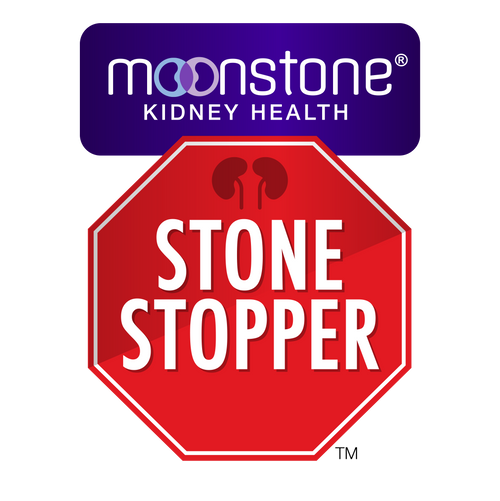
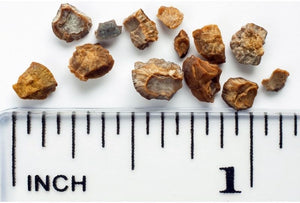
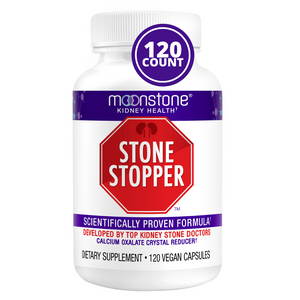
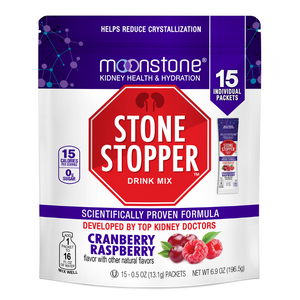
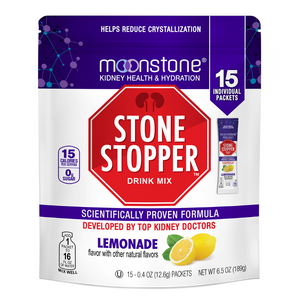
13 comments
I have been diagnosed with stones, can they be dissolved with this product?
I am A1C diabetic handled via diet most successfully BUT via ultralsound I have been advised that I have multiple kidney stones. No passings as of yet..size of stones unknown what can I do…please advise thank you Robert opuskahn49@gmail.com
Where can you buy moonstone